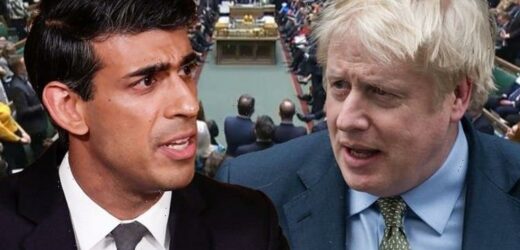Rishi Sunak says he’s ‘looking at all policies’
We use your sign-up to provide content in ways you’ve consented to and to improve our understanding of you. This may include adverts from us and 3rd parties based on our understanding. You can unsubscribe at any time. More info
The EU VAT is a five percent levy on energy bills that was introduced by the bloc in 1993. Prime Minister Boris Johnson pledged to scrap the extra fee back in 2016 when campaigning for Brexit. In an article co-written with Michael Gove, the pair wrote: “Fuel bills will be lower for everyone. In 1993, VAT on household energy bills was imposed. “This makes gas and electricity much more expensive… When we Vote Leave, we will be able to scrap this unfair and damaging tax.”
But now, at a time when energy bills have been soaring for millions of Britons, Mr Johnson poured water on renewed calls to scrap the tax, calling it a “blunt instrument”.
The move likely angered a group of 20 Red Wall MPs who called for the measure to be scrapped to ease rising bills.
The Red Wall is considered a traditional Labour stronghold in the midlands and north of the UK that the Conservatives snatched in the 2019 election.
And the Conservative MPs who snatched the seats from Labour are mostly Brexiteers.
While Mr Johnson seems to be losing support over the ‘Partygate’ scandal too, Mr Sunak may have his eyes on the prize.


With multiple energy suppliers already going bust, and with bills expected to soar by 50 percent when the price cap (maximum tariff) rises to £2,000 in April, the Government has been urged to step in.
And with inflation on the rise too, the situation appears to be escalating into a full-blown cost of living crisis.
With Mr Johnson in the mud for breaking his own Covid rules, Mr Sunak looks poised to step up to the plate by considering introducing measures himself to ease the crisis.
After having pressure heaved on him at the House of Commons this morning, the Chancellor hinted that he is ready to take action.
He said: “I am of course aware of people’s anxieties about what is coming.”

Former Conservative work and pensions secretary Stephen Crabb said in the Commons: ”Can I say respectfully to the Chancellor that we are going to have to do something around energy costs.
“On Friday I met with a couple in my constituency who showed me their fixed tariff agreement for energy coming to an end and a new one that is coming on stream is more than double.
“They are going to really struggle this year paying their energy costs.”
Mr Sunak responded: “He can rest assured that we will continue to look at all the policies we have in place to make sure that we are supporting people in the best way possible through the months ahead.”
DON’T MISS
Archaeology breakthrough as stunning Roman gladiator arena found [REVEAL]
EU fury: Nations fed up with bloc bureaucracy [REPORT]
Astronomers baffled as object near Earth unleashes burst of energy [INSIGHT]

The Times has previously reported that basic rate payers would be up to £750 better off each year if EU VAT was scrapped.
Mr Sunak has often made clear that he has a preference to cut taxes, despite raising them to help the economy recover from the pandemic.
And Brexit voters who were promised to have the EU VAT scrapped could be furious at the Prime Minister for turning his back on the pledge.
Earlier this month, head of Energy Utilities Alliance Mike told Express.co.uk: “It is a clear betrayal of Brexit voters, who were promised that VAT on energy bills would be scrapped.
“If the Prime Minister doesn’t stay true to his word, they would be right to feel they have been lied to.

“Whether he should have made that promise or not, without understanding the implications is irrelevant, he made that promise and he needs to deliver on it.”
But Mr Johnson said last month that the measure would only help “a lot of people who perhaps don’t need the support”.
Mr Sunak is also said to be looking at changing current schemes aimed at the low paid to help through the crisis, The Financial Times reported.
The paper reported that measures such as the annual £140 warm homes discount, the £300 winter fuel payment and the £25-a-week cold weather payment were all set to be expanded and payment increased.
Source: Read Full Article


